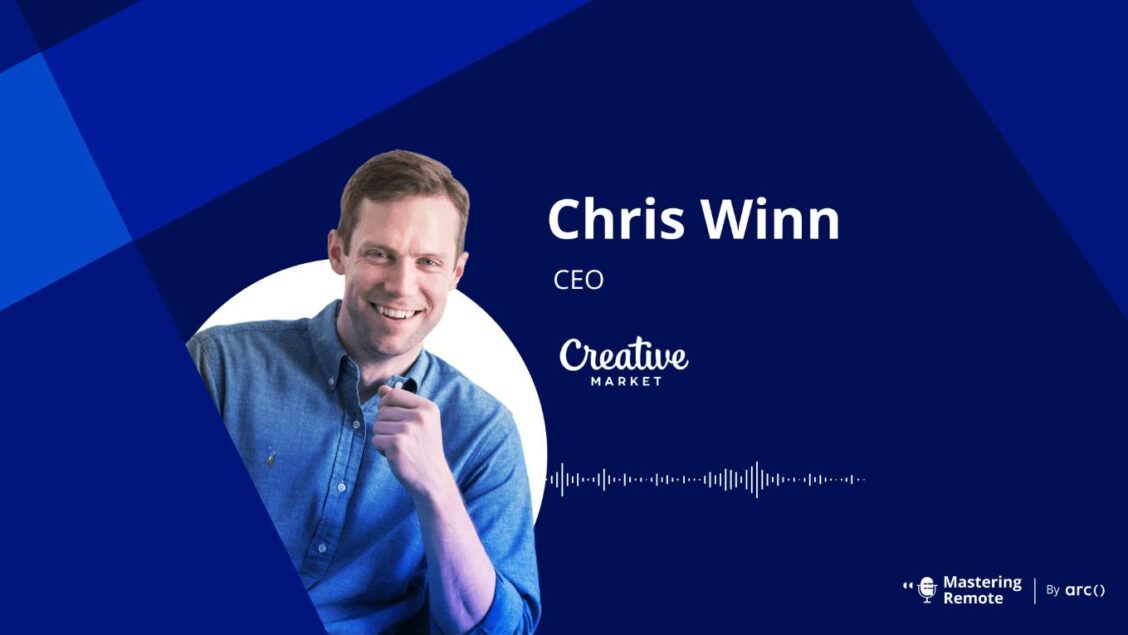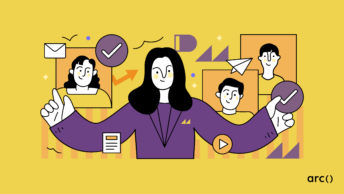Company culture change is hard, and doing it right is even harder. But how do you do it within an all-remote team?
Creative Market CEO Chris Winn sat down with Arc’s Head of Marketing Christine Orchard to chat about transitioning to a fully-remote company and how meaningful work ties together a remote team.
About Chris and Creative Market:
Creative Market is a marketplace for design assets, and Chris began his journey with the company as an engineer. From this beginning, Chris moved his way up to CTO, and then into his current position as CEO.
Looking for top talent fast? See how Arc can help you:
⚡️ Find developers, designers, marketers, and more
⚡️ Freelance or full-time remote + fully vetted
⚡️ Save up to 80% with global hires
Hire top talent with Arc risk-free →
How To Transition A Company to All-Remote
At this stage, the company was already primarily remote: only some team members were still in an office. In his first week as CEO, Chris made a big call: to take the company all-remote. Christine and Chris discussed the implications of this decision for the team, both from a retention and culture perspective.
We were just honest with the team. We said that this is the decision we’ve made. This is why we’ve made it. This is what it means for you. And we were really open. We said: “This is not gonna work for everyone. That’s okay. Come talk to us.”
Chris’ reasoning for this choice was that in-office and remote teams are not the same, and it’s not possible to make them equal. Trying to have both types of teams at the same time can create disadvantages for certain team members in certain situations. So he decided to go all-in on having a remote team.
Changing Remote Culture For Success And Growth
One of the things that needed to be addressed while taking the team remote was evolving the culture. One of these changes was that the team adopted a new set of core values. Chris discussed the fact that core values actually have to mean something to not just the team, but also the organization’s leader.
Something companies miss, sometimes, is: core values have to really mean something. It has to mean something to you as a leader, as the author of the values. The next step? Actually live those values.
You’ve got to live it. You’ve got to live it and you have to model it. One of the reasons “say the thing” is a value of ours is because it’s a value of mine.
(“Say the thing” is Creative Market’s core value of being honest, direct, and open — but without being mean.)
Of course, major changes can mean that people are impacted in different ways. For Creative Market, the decision to go all-remote and change the team’s culture meant that some team members decided to leave the company. As long as this is handled in an open and respectful way, with the team members’ contributions celebrated, Chris thinks this is a positive thing.
If people opt out of that, that’s not a bad thing. It’s so long as everyone feels mutual respect in that process, that it’s not a scary topic that you can talk openly about it.
As a leader, Chris talked about getting comfortable with change, and being honest about the fact that change is unavoidable. If the company has a strong culture, and is prepared to accept change in a positive way without overreacting, people’s departures can be celebrated, and the company can move forward.
Read More: How to Create a Remote Work Culture That’s Supportive, Positive & Fun
How To Hire For Remote Teams
Know the Problem You’re Hiring to Solve
The foundation for posting a job role is company need. As Chris mentioned in the episode, making the links between the company’s goals, the candidate’s skillset, and the challenge ahead explicit is a good thing:
Here’s why we do what we do, here’s our challenge. The reason why we need this role is because we have this really big challenge in front of us. And then the third part is, here’s why you are uniquely qualified to help us overcome that challenge. And we need you.
Before pitching strongly to a candidate at the end of the hiring process, managers should run through this thought process first. Is the need to hire there? Is the candidate a good fit for the role? Make sure you want and need this person to avoid creating a negative candidate experience.
Vet the Relationship as Much as the Skillset
Chris isn’t looking for team members who just put their headphones on and work all day. To succeed at Creative Market, you need to hire intentional over-communicators. How?
Chris spoke about favoring a consistent interview framework. But the questions themselves, according to Chris, are less important than looking into why the candidate is answering the way they are. What’s motivating their response? As he put it:
There are some skill requirements that matter for a given role, but otherwise what you’re really doing is: you’re vetting the relationship.
To Chris, the relationship is the foundation; everything else can grow from that.
Read More: Developer Retention: How to Keep Your Software Developers Happy
Check They Have the Soft Skills Your Team Needs
What makes an attractive candidate at Creative Market? Chris listed out a few of the qualities that they look for in their new team members:
- Purposeful over-communication
- Problem-spotting ability — then speaking up about it
- Humbleness
- Owning mistakes
- Wanting to interact with other teams
Build Remote Work Culture in Your Team
Human connection is what really makes remote teams work. Creative Market purposefully builds chances to connect into the foundation of their company. These include:
- Lunch and learns
- Slack banter/goofy gifs
- No context quote channel (and, later, a game show — who said what?)
- Team trips a couple of times per year
Regarding the importance of remote teams meeting in person, Chris noted:
We still meet each other in person. And I’ve observed before the quality and the frequency of the Slack communications between two individuals — it really goes up dramatically if they have met in person, and talked about things that have nothing to do with work.
However, Chris is strong on one thing: whether it’s evolving culture, bonding as a remote team, or hiring with purpose… what underlies a successful remote team is meaningful work.
Read More: How to Integrate Freelance Software Developers Into Your Current Team
Rapid-Fire Questions
The episode closed out with some quick questions and answers:
- How do you take a break? Running/getting outside.
- Synchronous or asynchronous communication? Synchronous.
- Who’s the most interesting person you follow? Kara Swisher.
- What’s the one remote work tool you can’t live without? Pen and paper.
- What book has had the greatest impact on you? Microserfs by Douglas Copeland.
You can also try Arc, your shortcut to the world’s best remote talent:
⚡️ Access 450,000 top developers, designers, and marketers
⚡️ Vetted and ready to interview
⚡️ Freelance or full-time








